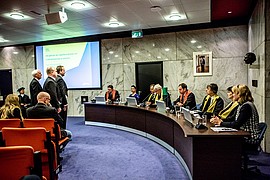PhD Defence: Willem Rietdijk

In his dissertation ‘The use of cognitive factors in explaining entrepreneurship: some empirical results’, ERIM’s Willem Rietdijk studies novel factors that may explain entrepreneurship better. His thesis takes entrepreneurship as a starting point to investigate the associations with two new potential cognitive factors, viz., neurocognitive measures on the one hand and self-reported psychiatric symptoms and individual differences on the other hand.
Willem Rietdijk defended his dissertation in the Senate Hall at Erasmus University Rotterdam on Friday, 15 January 2016, at 9:30. His supervisors were Prof.dr. A.R. Thurik and Prof.dr. I.H.A. Franken. Other members of the Doctoral Committee were Prof.dr. Kirsten Rohde (ESE), Prof.dr. Henning Tiemeier (Erasmus MC), and Prof.dr. Patrick Groenen (ESE).
About Willem Rietdijk

Wim J.R. Rietdijk (1988) attended the Erasmus University and graduated with a Master degree in Business Administration and Master degree in Epidemiology. In 2010 he started his PhD with Erasmus Research Institute of Management. In his research, Wim attempts to build a relationship between economics and (cognitive) psychology. He co-authors several papers regarding the associations between cognitive factors, psychiatric symptoms and economic behavior that fit within the conceptual model of the present thesis. Furthermore, he presented his work at various international conferences including American Accounting Association, management accounting section in Orlando (USA) and NeuroPsychoEconomics conference in Bonn (Germany). He also visited the University of Michigan (Ross School of Business/Department of Psychology) as a visiting scholar for seven months in 2013. Currently, Wim is on the job market outside academia.
Thesis Abstract

‘What makes an entrepreneur?’ This is an important question for many researchers in the past three decades. Although this is a fundamental question, research usually find incomplete and uncertain answers to this research question. Thus, it is of imperative importance to study novel factors that may explain entrepreneurship better. Therefore, this thesis takes entrepreneurship as a starting point to investigate the associations with two new potential cognitive factors, viz., neurocognitive measures on the one hand and self-reported psychiatric symptoms and individual differences on the other hand. Chapter 1 introduces how the five chapters fit in the conceptual model this thesis builds upon and discusses its main motivation and contribution. Chapter 2 and 3 examine the internal consistency and functional significance of important neurocognitive measures. The results provide guidelines for future research and suggest that more research is needed to fully understand what these neurocognitive measures reflect. Chapter 4 and 5 investigate the association between attention-deficit/hyperactivity (ADHD) symptoms and entrepreneurial choice and orientation. The findings suggest that there is a positive association that is primarily driven by hyperactivity symptoms. Finally, Chapter 6 studies the association between present and future temporal focus and entrepreneurial orientation in a sample of solo self-employed individuals. The results suggest that for these individuals a future focus is more important compared to present focus for the entrepreneurial orientation and that a focus on both temporal foci simultaneously comes at the expense of their entrepreneurial orientation. Taken together, this thesis presents initial results associating new potential cognitive factors that may explain entrepreneurship and opens up ample room for research in this direction.
· View and download Willem's dissertation
Photos: Chris Gorzeman / Capital Images


